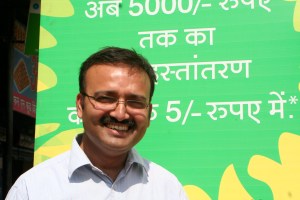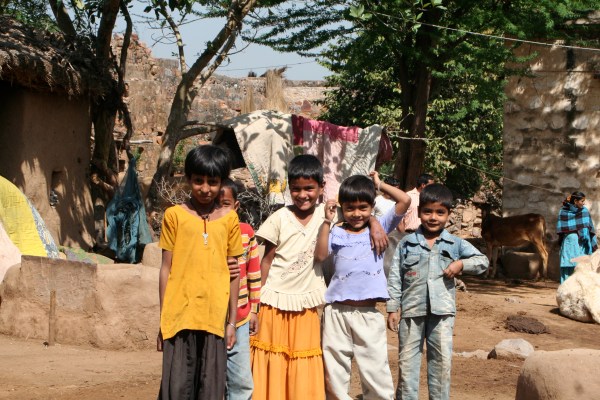Innovative mobile banking platform Eko India Financial Services has raised $5.5 million from Creation Investments’ Social Venture fund, Promus Equity Partners and several unnamed angel investors. Mobile banking is one of the most exciting trends in the tech world outside Silicon Valley. And now that more people have mobile phones than toilets in the world, there’s a real chance at bridging the unbanked gap.
Forget glitzy iPhone financial apps. The most innovative stuff is mobile payments is being done using basic SMS, and it’s dramatically changing people’s financial lives. Savings soar when your money isn’t readily available, people can safely travel between villages without fear of being robbed, and paying for goods and services no longer requires an in person transaction.
The coolest part of this trend: Much of the strides are being made by for profit companies, not aid groups and NGOs. They help millions of people and build self-sustaining businesses that make money doing it. One of Sequoia Capital’s hottest Indian investments was SKS Microfinance, which makes micro-loans along the lines of Grameen Bank and went public last year in an over-subscribed IPO. Two more of my favorites in India are Pune-based SMSOne, an SMS-based newsletter that delivers literally life-saving information to rural India, and VNL, which makes telecom services available to people for less than $2 a user, per month profitably.
India excels at these types of startups and good thing: Fewer than 14 million people work in India’s formal economy, and more than 700,000 Indians still live in villages without access to roads, sanitation or electricity. Reaching the poor digitally is the only way to unlock the huge demographic potential of the country.
There’s a broader cultural impact from services like these too. As Eko’s founder Abhishek Sinha explained the last time we met, “My duty is to disrupt other people’s aspiration levels. Why shouldn’t we all have big dreams? No more putting money in a jar, no more sewing money into a false pocket inside of their shirts, no more money under the mattress. The unbanked poor in India will only have real control over their financial future when the cash is out of everyone’s physical reach.”
I first met Sinha (pictured to the right) in Delhi in November 2009, met with him again on my next trip and we’ve  stayed in touch since. The last time I saw him he’d processed less than $1 million in transactions over the life of the business. He’d just deployed a major shift in strategy that’s apparently worked: In the twelve months following our last meeting Eko has processed a staggering $270 million in transactions– most of them for less than a few dollars at a time.
stayed in touch since. The last time I saw him he’d processed less than $1 million in transactions over the life of the business. He’d just deployed a major shift in strategy that’s apparently worked: In the twelve months following our last meeting Eko has processed a staggering $270 million in transactions– most of them for less than a few dollars at a time.
What I love about his approach is how drop-dead simple Eko is, totally tailored for the basic needs of India’s massive unbanked market. The product relies on a numerical system, so that people don’t have to know how to text alphabetically, don’t have to speak a certain language or dialect or even know how to read to use it. The verification system is a paper-based version of an RSA token that VeriSign endorsed early on. (You can read more about it in my previous TechCrunch post on Eko.)
The most clever part of the business is its distribution network. While the accounts are backed by the State Bank of India and ICICI Bank, Eko has created “tellers” out of the trusted corner grocers who operate throughout India. These are the masters of the country’s huge micro-economy that sells cell phone minutes by the Paisa, medicines by the pill and Western brands of shampoo by the ounce. These grocers are the center of the unbanked migrant poor’s world, and the best people to evangelize and trouble shoot Eko’s accounts. And Eko has made those accounts work with their varied and rudimentary book keeping and transaction systems.
The challenge for Sinha has always been the grand scope of his vision. This is obviously a business that needs scale to survive, but getting that scale is near-impossible without deep pockets. India is a huge country with deplorable infrastructure, and the very people he’s seeking to reach are the most fragmented, transient and most difficult to market to.
While the corner grocer delivery model is ingenious, it takes work to sign up and manage each store and each store only serves a neighborhood. The challenge of even rolling Eko out comprehensively to a single Indian city makes the notorious challenges of selling to small businesses in America seem like nothing.
Originally Sinha tried to outsource managing the distribution partnerships and signed up only 6,000 accounts. That jumped to 20,000 new accounts per month once Eko took a more expensive hands on role to managing the grocers. Today Eko has jumped to more than 900,000 accounts, processing nearly 2.3 million transactions through a growing network of 1,300 agents. “Things have been messy, tricky and exciting since we last met,” he wrote to me yesterday. That probably sums up entrepreneurship in emerging markets better than my 75,000 word book on the topic did.
Eko has had several champions during its up-and-down journey from The Gates Foundation to the World Bank, but the bulk of the money has come from Sinha who sold a software company before starting Eko. I’m surprised it took Eko this long to secure more funding, but not surprised Sinha eventually found it. I included him in my recent book because he personifies the “Brilliant, Crazy, Cocky” personality type I was seeking. He’s one of those entrepreneurs who burns the boats and will find a way to make things happen, no matter what it takes.
More than a year ago when funding was already running low I asked if he was worried he just wouldn’t find it, and he’d have to give up on Eko. He laughed off the idea. “I’m not proud to say I’ve defaulted on every credit card and on every loan I’ve ever had. I’ve paid bribes to get more credit,” he said. “After a point in time you stop worrying. You get to know you’re a lucky guy and push yourself further.”
